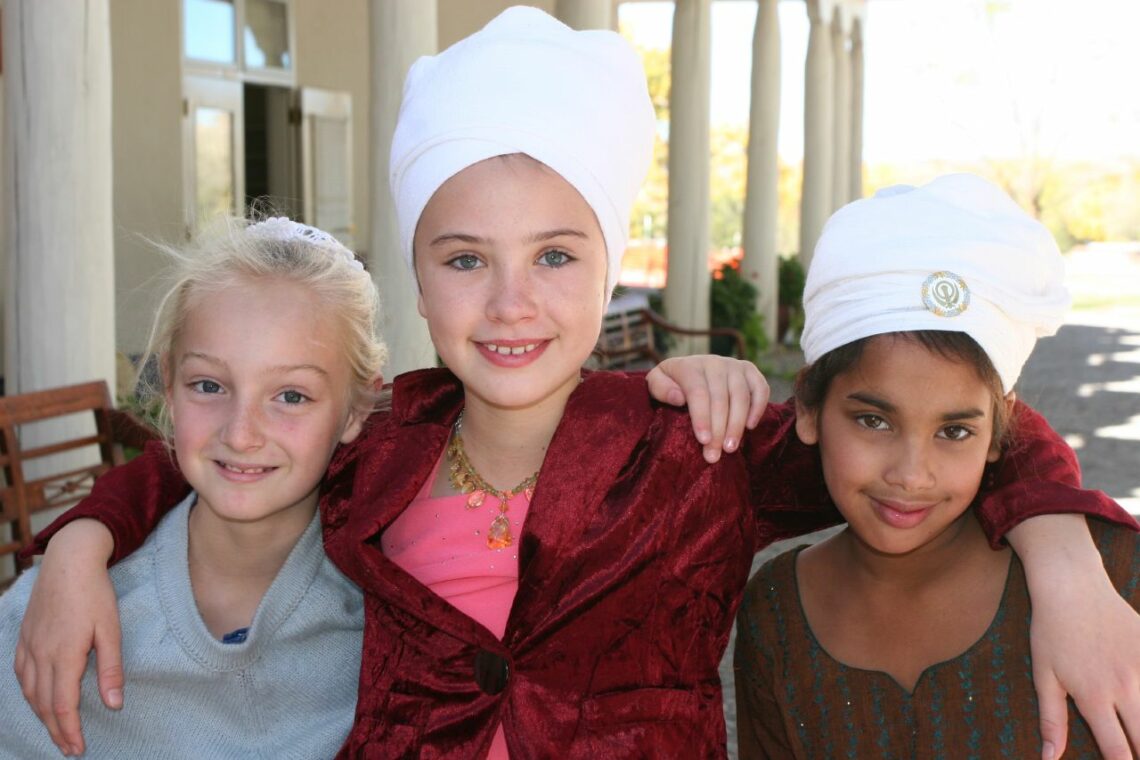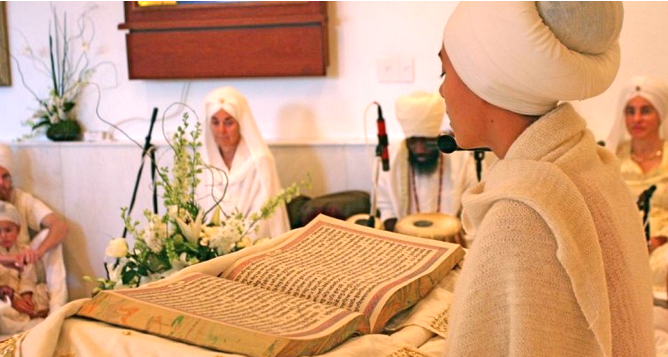by Lakhpreet Kaur
So many folks talk to little Kaurs and little girls about their looks. It’s often innocent and well meaning with remarks like, “You’re so cute!” But it could be damaging to young girls’ self-perception. This article explores how we can change our unconscious language and send more Gurmat-inspired messages.
At gurdwara or a kirtan, I’m often times at a loss as to what to say to the young girls there; the 5 to 7 year old Kaurs. To break the ice, I often remark something like, “I like your suit!” or “You look pretty today!” I have overheard aunties say things like, “You look like a little princess!” to little three year old girls, so I followed suit.
I didn’t think anything of my comments until I read Lisa Bloom’s Huffington Post article, “How to Talk to Little Girls,” and I immediately felt terrible about my go-to ice breaker about the girls’ looks. I always thought I was making little girls feel nice and encouraging them to talk to me, but according to Bloom, I might have been doing more harm than good.
With my comment of, “You looks so pretty today,” I was teaching these girls that their appearance is the first thing people notice. I was telling them that their looks are more important than anything else.
“When we spend a lot of time talking about something, we send a message that the topic is important,” writes professor of psychology, Dr. Renee Engeln. “If we regularly talk to our children about kindness, we’re letting them know that kindness matters… And when we constantly tell little girls how pretty they are, we’re communicating that looks matter, and that they matter especially for girls. When we comment on a girl’s cuteness more consistently than anything else about her, we suggest that her appearance means more than her other qualities.”
We often think being overly concerned with looks starts with teenagers. But, comments about girls’ look can start as soon as birth. “This focus on how girls look starts much younger than you might imagine. One classic study interviewed parents 24 hours after the birth of their child. Although the male and female infants in the study did not differ in terms of size or Apgar score (a basic summary of a newborn infant’s health), parents were more likely to describe newborn daughters in appearance-related terms…” writes Dr. Renee Engeln.
Then, as soon as age 3 to 6, many young girls become worried about being fat and some girls under 12 years old wear makeup regularly. Eating disorders are up and self-esteem is down. “As our cultural imperative for girls to be hot 24/7 has become the new normal, American women have become increasingly unhappy. What’s missing? A life of meaning, a life of ideas and reading books and being valued for our thoughts and accomplishments,” says Bloom.
One parent explained how he feels that focusing on looks has the immediate impact of shutting his daughter down, “People often say, ‘OMG, you’re so cute!’ to my daughter all the time and it bugs the shit out of me. (I mean, I get it, she’s cute. But come on.) It also completely shuts her down because she suddenly feels so self-conscious about herself and her appearance…which has led to her to be more cautious about new people and wary of cameras, the ultimate unblinking eye of cuteness collection. And this is a very chatty, social, and engaging kid we’re talking about here, but the ‘you’re so cute’ conversation opener twists her up into a pretzel of self-consciousness that’s so unlike her usual self.”
What we talk about with kids communicates what we value, and if we want to send Gurmat-inspired messages, it’s important we don’t focus on physical appearances.
“Gurbani addresses this very topic of inner versus outer beauty,” writes Ravin Kaur. “The Gurus wrote many verses about what it means to be a truly beautiful person or a pretty Kaur, and we we can learn from theses shabads…The best ornament that we can constantly wear around our neck is the one of consciousness of the Divine.”
If the mind becomes the ornament of pearl and every breath the string…one becomes pleasing to the Divine and enjoys Divine love. ~ Asa, Ghar 6, Mehala 1, Guru Granth Sahib, Ang 359.
When meeting a little girl, complimenting her appearance might feel automatic; most of us do it without thinking. But with some practice, we can send a different message to the girls in our lives. We can use our conversations to show that we value them for qualities that have nothing to do with how they look. The next time you’re tempted to call a little girl “pretty”, consider all the other qualities you admire in her. Steer the conversation in a different direction.
So, with Bloom and Engeln’s suggestions I started to change the way I talk to little Kaurs. This is what I’ve been trying out:
1. Introduce myself.
2. Ask her name.
3. Ask her questions. “Questions let her know you’re interested in her life. Open-ended questions also help to build language and memory skills. Ask her what she’s doing, what she’s learning, what she loves,” writes Dr. Renee Engeln. Ask about her plans, her toys, school, books, sports, art, music, Sikh history, gurdwara, kirtan, …
4. Relate to her answer, “I LOVE soccer too!” or “I used to read Magic Tree House books too!” or “What’s your favorite shabad to sing?”
5. If you know this Kaur well, talk to her about why she matters to you. “Tell her you’re happy to see her. Tell her you’ve been thinking about her, that you’ve been wondering what she’s been up to,” writes Dr. Renee Engeln.
5. Try to keep the conversation away from clothes, hair, or bodies. “Praise her for attributes she can control. Notice when she works hard, or when she doesn’t give up. Thank her for being kind to others. Compliment her curiosity,” writes Dr. Renee Engeln.
As Bloom wrote, you can be “…one tiny bit of opposition to a culture that sends all the wrong messages to our girls. One tiny nudge towards valuing female brains. One brief moment of intentional role modeling.”
A father of a one year old daughter said, “I want my little girl to grow up to be comfortable with her body, regardless of the shape it takes over time. I want her to realize that her looks and ‘prettiness’ do not define her as a person, and that being concerned with her character, intelligence, wisdom, relationships, and faith…will result in far greater dividends than focusing primarily on her looks.”
If I was to meet Bibi Nanaki or Mai Bhago, I don’t think I would say, “OMG I love your embroidered duputta! Where did you get it?” I would ask deeper questions and try to connect on a non-superficial level.
With a little bit of mindfulness, we can can change our automatic linguistic habit and try to align our language with our values. Our Kaurs of the past had much more to offer than their looks, so let’s make sure our Kaurs of the future do too.
Photo by Gurumustuk Singh





No Comments